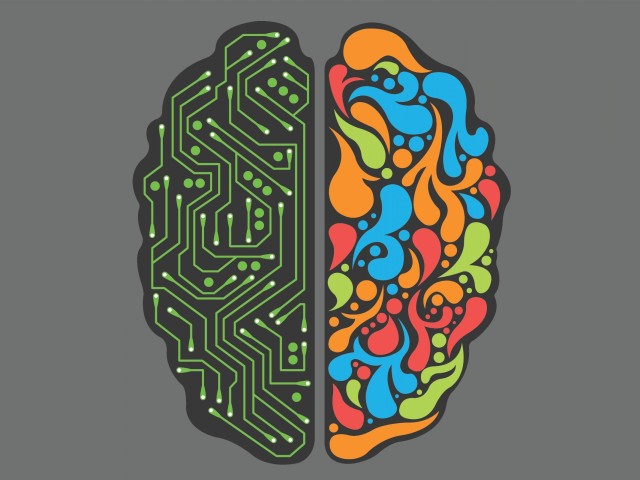Read the first part of this series here.
The human brain is truly astounding – the way it works, writes codes into its cells and neurons, creates files, stores them in various sections and then retrieves them when needed (and sometimes when not needed!) is more complicated than the best computers made by the same brain. The process of encoding a memory begins when we are born and goes on till we die, barring some damage or deterioration to the brain cells in the form of illness, injury or ageing.
(Read the first part of the post Why do we need memory here.)
So what becomes a memory?
For something to become a memory, it must first be picked up by one or more of our senses – or in other words, have some feeling or emotion attached to it. Such memories don’t include the remembering of motor skills or the Pascal’s Law or something similar.
(There are so many things about the different kinds of memory that you better be warned that there would be another post in this series! For this post, let us stick to the ones that evoke pleasant and unpleasant feelings in us when they are recalled.)
We go through so many motions in our daily life that if everything were to become a memory, our brain would run out of memory! So the brain deletes or overwrites them to create space for more important ones. That is why we can’t remember what we had for breakfast on the 14th of June, for instance.
Come to think of it, who would want to remember things like putting out the garbage or making a cup of tea, or talking to a neighbour, unless some significant thing had happened at that time? Perhaps if that appointment letter for a dream job had come when I went out with the garbage, I might remember it every time I put out the garbage!
That brings us to triggers. No matter how significant a memory is, it mostly lies dormant in our brain until a trigger sets it off. A photograph, a smell, a face, a place, a sound…..any of these things can bring a memory into focus. While a photograph of your child or mother might bring a rush of love, another one of you in front of the Statue of Liberty might not evoke any emotion, unless it had been an occasion with special significance. In which case, every time you look at the picture, that memory would come rushing in. On an aside, how many of the selfies taken so painstakingly and shared on social media evoke any memory?
Now we come to the question of whether we experience the same feelings when we remember an event, as we did when it had originally taken place?
Alas, our feelings at a particular moment can only be experienced once and all memories are essentially in the past – a day, a month, or several decades. No matter how sharp our memories are and how well we remember (or imagine we do) them, the ecstasy, contentment, grief or terror we had felt when the incident had happened cannot be replicated in the present moment. How can we live again through the sounds, the smell, the colour or chill/heat of a moment that lies in the past? Everything changes over time – including us and our reactions to a given situation.
If only we could somehow capture everything about a perfect moment how wonderful it would be! As my friend Dagny wistfully remarks in her beautiful post:
Wouldn’t it be wonderful if we could store moments of perfection, bring them out at will and completely resurrect them in all their richness; in every beautiful enchanting detail? We’d be able to recreate the bliss by unpacking all its constituent emotions – the contentment, the gratitude, the feeling of blessedness and grace.
Were that possible, how I would love to experience the indescribable joy of holding my child for the first time in my arms – smelling his baby smell and feeling his finger on my skin, or the leap of my heart when I met my best friend after half a century, or….there are too many such moments I would give my eye tooth to relive.
Perhaps this is why in the ‘perfect’ society envisioned in The Giver, the Giver loses his memories the moment they are transferred to the Receiver. (If you have not clicked the link at the outset to read the previous part, do so here).
I am sort of relieved it is so, for most of us have memories that we wouldn’t want to relive under any circumstances. Sitting up night after night, feeling a gnawing pain in my chest, feeling hollow inside, not knowing what the next day would bring after the catastrophic event…or the times when the children were small and had come down with serious illnesses and I had suffered their pain and cried inside for their little bodies to heal even while laughing and singing to put them at ease….or the time I had died a thousand deaths when the older one had been caught in a riot on his way back from school and I didn’t know where he was….
While I am blithely recounting all the feelings I had experienced at those times, I still am not living through them. I might recall the time, the place and the people around, but not the actual emotions of terror or helplessness. Am I glad about that! Who on earth would want to experience such terrible feelings all over again?
Here I am reminded of the Chinese legend of Meng Po or The Old Lady of Forgetfulness who works in Di Yu (the Land of the Dead). She gives them the Brew of Oblivion, which helps them forget their previous life so that when they are reborn in new bodies, they do so with a fresh mind. 
Though we might not be able to feel the same emotions, memories can release enough chemicals in the brain to set in motion physical and emotional reactions like contentment, joy, love or laughter if they are happy ones and nightmares, terror, anger, agitation or even real illness if the memories are particularly traumatic. It is estimated that every time a bad memory causes a stressful response, it takes up to 36 hours for the body to get rid of the stress hormones.
Sometimes too, there are no visible physical or psychological cause for a physical ailment or pattern of behaviour – at least in the present life. Dr. Brian Weiss in his book Many Lives Many Masters has recounted his sessions with one of his patients whom he helped get rid of painful memories carried over from not just one, but several lifetimes spread over millennia by using a method called ‘regression’. That memories get carried over lifetimes is also reiterated in the book Many Mansions: The Edgar Cayce story of Reincarnation by Gina Cerminara who has studies thousands of recorded cases of reincarnation stories. You can read the posts on these two books here and here.
Perhaps these are the souls that had evaded Meng Po and her brew of forgetfulness and are therefore carrying memories from their earlier lives!
It is interesting that under hypnosis or an induced trance-like state, one can actually feel all the emotions, pain and pleasure while reliving the memories. But typically, those feelings don’t leave any memory once the person is out of trance or hypnosis, quite simply because the memory has been wiped off. They only needed to be experienced once again before ceasing to bother the patient.!
This is how it happens: Under hypnosis, the patient is relaxed and the strong emotion associated with it is first brought forth and then removed from the memory along with its triggers through relevant suggestions by the therapist. Shorn of its emotional baggage, the memory is rendered powerless to hurt the person and soon fades away.
That brings us back to the brain which is the storehouse of all memories. I read up on the physical structure of the brain, which is divided into a lot many sections. But we will only learn here about the rational mind and the emotional mind. With distinct functions, these two help us carry out our work, think, create art, solve problems and so on. I won’t bore you with the details but will give you the link if you are interested.
When you remember an event, the rational mind tells you that it is an incident in the past, so don’t get worked up over it; but the emotional mind tells you to react immediately – laugh, cry, shout or hit out. The two minds not only contradict each other in their commands, but work at different speeds too. The emotional mind is quick to run ahead like the Hare in the story of Hare and Tortoise, while the rational mind, like the Tortoise is still logically and methodically deliberating over the situation. So even though it controls about 90% of our decisions, the rational mind is easily overtaken by the emotional mind when it comes to dealing with powerful memories – in a way, rewriting the fable.
We are only too happy to obey the emotional mind and relive the pleasant memories, but what about bad ones that get us agitated and angry or terrified? After all, they are the ones that disrupt our lives.
We can listen to our rational minds and learn to take bad memories with their attendant emotions as part of life and thus overcome their negative effects. Most of us are able to do it too, but if it is a particularly traumatic memory involving physical or emotional abuse, or an accident or a natural disaster, the emotions unleashed can play havoc with our mental and physical wellbeing. Professional help is needed to deal with them.
(How to overcome such trauma is beyond the scope of this post. Maybe sometime in the future…)
To sum up, one should ideally aspire to become dispassionate about both happy and traumatic memories, but that is going to take some work and time to accomplish if at all. Till then, let me pick and choose my most pleasant memories , the ones I want bottled up to be taken out at will to sniff and savour….
Images: Homepage – Edgar Cayce’s ARE
This page top: 123RF.com ; Centre : WallpapersFAN ; Bottom: i backgrounds








[…] Next: Why do our brains not run out of memory? […]
LikeLike
very informative and interesting post! These memories and the urge to get rid of them is I feel the reason behind most illnesses as around 80% of all the diseases are psychosomatic.
LikeLike
Oh, I am sure they are the result of traumatic or painful memories, in many cases. We need a way to deal with these memories to rise above them and move on with our normal lives. Thank you, Ankita 🙂
LikeLike
What a fascinating topic, Zephyr. I remember in my recent post about my mum, I spoke how I feared losing the memories I have of her unassisted as they are by normal props like physical photos. While all of us want to forget bad memories, it is the good ones we wish to hold on to. Also, have you noticed that our perspective about the memory may change as we grow older.
Something that we may have looked at with bitterness could have become more bearable now. I have personally experienced it especially as I got older, more wise and also became more forgiving. Losing precious memories will be devastating almost like losing those precious moments and people in them forever.
LikeLike
I remember that poignant post of yours, Rachna. Loved it for the honest emotions you had shared in it. Yes, we do need triggers of some sort when the memory is in the far past, unless of course, you have aged enough when the short term memory has begun fading while the long term ones are in sharp focus. {photographs are the biggest triggers for recalling events connected to any person and it must be hard for you to remember details of your mother.
As I have mentioned in the post, one of the reasons why we will never experience the same feelings as we did during the actual event, for the same reason – not just the time, but also our feelings and the perspective towards the event would have changed, so the experience would necessarily be different. And yes, we mellow down as we grow older, more readily forgive and move on.
LikeLike
I always thought, and it is true to a large extent, that I have a very bad memory. No, I am not talking about memorizing mathematics formulas or theoretical concepts in public finance (that was also a struggle, believe me!) I mean personal memories – events, situations, experiences in my life. For example, I don’t remember much from my school days, college days or even from the years at my first couple of workplaces. Just a few moments, some hazy images of some specific events, and a vague, general sense of the overall experience remain in my memory. At times I feel embarrassed when I meet with some people from those years – which itself is very rare, thankfully – that I don’t remember many things that they are talking about, as if it just happened yesterday! I wonder if this is because I didn’t attach too much or any emotion – pleasant or unpleasant – to those experiences. Or that I wasn’t fully involved in those experiences. I can’t say.
Or maybe it is because I didn’t recall those times/things/experiences enough or that frequently, so they just kept getting erased. Maybe there is a connection between memory and recall. The more we go down the memory lane, the more a memory gets stronger perhaps. New constructions and reconstructions of the memory get added on. Maybe even new or modified emotional layers also get added on. Possible?
I think there is also something to be said about the link between aging and memory. No, no, I don’t mean to say that we become more forgetful as we age. Rather, most people become more interested in recalling their memories as we age. I wonder if you will also speak something about that in your next article on this topic. I like the distinction you make between recalling and reliving. And that is something important in this aging connection also, I think, especially since with advancing age people are also dealing with several other physical health issues. To what extent memories can enhance or diminish the quality of their life at that stage is something worth reflecting.
LikeLike
You are not the only one, Beloo! I don’t remember so many things from my childhood, school and college days and even later. When I met my friend after half a century, she recalled that the first day I had joined the school I had made a butterfly with my name woven into it in the drawing class!! I mean, seriously! How could she remember that? I think some people have pockets in their brain where such incidents are stored. I am embarrassed that sometimes it is my sisters or others who remind me of incidents involving even my children. Now, no one can accuse me of not being involved or giving enough importance to them,can they? My brain also routinely discards and overwrites a lot of memories, which is why I sometimes long to recapture good memories in their entirety, so that I may savour them better the second time around 🙂
Ageing has a lot to do with the wear and tear of cells in the body including the brain. Which is why some memories get etched while others just fade away. My sister tells me that what is dubbed as dementia and even Alzheimer’s are nothing but the deterioration of the memory which can happen faster or slower depending upon individuals. Oh, this will become a veritable research project, so many different threads are there to the topic, but I am not equipped to do justice to it. Which is why I am thinking of co-opting an expert 🙂
And yes, memory has a lot to do with recall too, though it is not the only thing that keeps a memory alive. Interestingly, today nostalgic trips are taken by the millennials more than oldies like me. They hanker after the ads, the music and the lifestyle of — the 80s and 90s!
LikeLiked by 1 person
The ability to forget and move on is probably the biggest gift we have. The other day I was thinking, what if we were to remember everything about our past lives and the burden of remembrances was quite unimaginable. Or what if we were to know the chain of who had evolved into what, our chain of enemies and friends would not be broken even after death and in fact, would go on accumulating !
LikeLike
What a unanimous feeling about forgetting the past! We all have to thank Meng Po for wiping our memories clean before sending the soul on its way 🙂 It is indeed a burden to carry memories, whether from this life or others past. If you have not read the two books I have mentioned, you should. They are most revealing about memories that are carried forward and the kind of disturbance they can cause in one’s life.
LikeLiked by 1 person
Zephyr, you’ve evidently given a lot of thought to this subject!
Unpleasant memories- well, most would not like to keep them fresh. But I’m not sure that I’d like to remember even pleasant events so clearly as if reliving them. If we were able to do so, many of us would perhaps be content to live in the past and not ‘move ahead’ with life……
LikeLike
Agree, Manju! The entire post is one of wistfulness in that sense, knowing fully well that the brain is the boss, retaining only the strong memories and forgetting the rest. I had wanted to explore the rational and emotional minds a little more, but was afraid it might become too technical, not to speak of addling my poor brain to first understand and then write about it 😀
LikeLike
To be frank this was a bit heavy for me.I am thankful to God that He has ensured that with the passage of time, the memory of most of the past events gradually gets erased and the intensity of human emotions surely gets blunted.Otherwise life would be one hell.Just as I would not like to relive the intense grief over the passing away of someone dear to me,I would not like to savour the silly joy I experienced over eating a tamarind fruit on my way to elementary school.
It is a different thing if medical professionals induce one to remember temporarily past events for a specific reason under proper authorization.
It would be good if a way is found to enable us to remember important things and forget the irrelevant and also the ability to retrieve when needed.I feel I store the latter than the former!
LikeLike
For all your saying that it was heavy, you have got to the bottom of the post. My posts might ramble a bit, but I try to make them simple, because I myself can’t digest heavy stuff 🙂 I agree that it is a big price to pay for enjoying happy moments if it meant doing the same with bad ones too. You are blessed indeed that you are able store the important ones and are able to discard the irrelevant ones.
LikeLike
While it is easy to find the positives of not being able to perfectly recollect everything of an unpleasant memory, the positives of not being able to perfectly recapitulate everything of a joyous memory are not given enough credence to. Yes, especially in our traumatic moments, the allure of being able to revisit past pleasant memories in all their glorious splendor is irresistible. The point IS that it has the ability to keep you living perpetually in the past AND begrime your current joys with the odiousness of comparison. Life is all about living the day and the imperfection of memory, in all its connotations, is what will keep you living the day.
A more trivial example: Assume that a love has soured. IF you can perfectly recollect the joys of the initial days of love, how prone would you be to be able to put it aside and move on with life?
LikeLiked by 1 person
Ah, this is the point I had left out talking about, hoping that it will be raised in the discussion and I am so happy that it is being commented upon by you all 🙂 Memories have a way of imprisoning us in the past, good or bad. But the main point I was talking about was about experiencing the complete feelings in all their fulness. We all like to think of good times and events, and if at that moment we could experience all the feelings, what do we lose? Of course, it would mean we would have to relive horrible memories too and since we can’t pick and choose, we have to settle for the pleasant and unpleasant reactions the memories evoke. (Not that we have any choice in the way the brain works!)
As for your example, I would think that once a relationship sours, everything about it sours too, or that is what I think. In which case the happy moments would have also turned bitter or melancholy, depending upon the way the relationship broke up – in which case, it doesn’t remain a pleasant memory any more.
LikeLike
When I studied Neuro-Linguistic Programming (NLP), I found out how to enhance or diminish a memory. I also learnt the different components of a memory and how each individual has a different ‘style’ of memorizing depending on which component they have the strongest propensity for.
Your post reminded me of all the techniques NLP uses to ‘heal’ traumas and highlight happy times. I am yet to read all the links you have given here. I also want to read the book you mentioned in the first post, ‘The Giver’. Together, your posts, the links and the book, would surely prove to be very valuable resources to let me learn more about all this.
I’m super pleased my post found mention in yours. Talk of reverberance!
Hugs!
LikeLike
Your post did reverberate! Else this post might never have been written. After all, it languished in my head for over two years! Neurolinguistics, is it? I told you, this memory business is leading me on a trail without an end in sight. We do need to do a post on handling bad memories and coming out on top. I am thinking and can see a glimmer of an idea 🙂
LikeLiked by 1 person
“We” need to do a post? We do? 😀
LikeLike
You bet! 😀
LikeLike